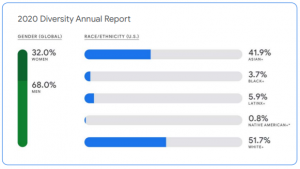Google LLC is a global technology corporation based in the United States that specializing in Internet-related services and products such as online advertising technologies, a search engine, cloud computing, software, and hardware. Along with Amazon, Facebook, Apple, and Microsoft, it is considered one of the five Big Tech corporations.[1] Google was founded in September 1998 by Larry Page and Sergey Brin while they were Ph.D. students at Stanford University in California. [2]
Contents
Racist Blunder
Back in 2015, Google was criticized for an image-recognition algorithm that auto-tagged pictures of black people as gorillas. This incident happened in the Google photo service, which was launched in May 2015, automatically tagged uploaded pictures using its artificial intelligence software. The incident involved Jacky Alciné who complained on Twitter after the Google Photos app mislabeled Alciné and his friend as gorillas in the photo he uploaded. Shortly after, the chief architect of social at Google named Yonatan Zunger thanked Alciné via Twitter. Zunger said that Google used to have a problem with people (of all races) got mistagged as dogs for similar reasons. He said that the causes of image recognition problems were the obscured faces and different contrast processing required for different skin tones and lighting.
As a direct result of the 2015 incident, Google Photos would never categorize any image as a gorilla, chimp, or monkey, including photos of the primates themselves. Google confirmed that it removed the offending terms from its search and image tags database. In an interview with the Guardian, the Google spokesperson remarked that image labeling technology was still in its early phase and was nowhere near perfect.[3][4]
Racist tags had also been a problem in Google Maps. Searches for the terms “nigger house” and “nigger king” in Washington DC earlier in 2015 yielded results for the White House, the official residence of United States then-President Barack Obama. Google official told the BBC that the company was outraged and really sorry that the incident happened and promised to prevent further incidents from occurring in the future.[5]
Racial Discrimination
In 2020 Google was under fire for firing one of the black woman AI researchers by email. This dismissal was due to the researcher being outspoken about the company's failings to address its workforce's lack of diversity. Timnit Gebru claimed her supervisor dismissed her through email after refusing to withdraw a research article. The article raised concerns about artificial intelligence, especially Google's use of the technology. In the email from Google’s executive in charge of AI, Jeff Dean stated that Gebru's article did not fulfill the guidelines for externally published work. Hence as a consequence Timnit Gebru was fired. Following this incident, more than 2000 employees signed a petition to Google, protesting how the company handled the situation. Google was also widely criticized by academic researchers on social media. As a consequence of the public outrage, Sundar Pichai, the CEO of Google, apologized to the workers and promised further investigation. However Sundar Pichai did not express regret to Gebru.
Pichai wrote in an email, “We need to accept responsibility for the fact that a prominent Black, female leader with immense talent left Google unhappily. This tragedy has sent shockwaves across some of our most marginalized populations, who recognized themselves and some of their experiences in Dr. Gebru's work. It was also truly believed since Dr. Gebru is a specialist in a crucial area of AI Ethics in which we must continue to grow - development that is contingent on our capacity to ask ourselves difficult questions.”
Gebru joined the company in 2019 from Stanford University. She studied how artificial intelligence might perpetuate racism, sexism, and other prejudices in the long run. Her employment boosted the image of Google as a business that hired top Black researchers and concerned about potential dangerous applications of the AI. Gebru responded to the issue of her dismissal on her tweet (now unavailable) not to paint her as an ‘angry Black woman’ for whom Pichai need ‘de-escalation strategies." Gebru also tweeted that Pichai accused her as out of the line. In Gebru's view, Pichai failed to acknowledge that the company failed not to discriminate, retaliate against her, or have her face a hostile work environment.
Safiya Noble, an associate professor at UCLA and co-founder, co-director of the UCLA Center for Critical Internet Inquiry, and the author of "Algorithms of Oppression," remarked that Gebru's dismissal was due to Gebru investigating the discriminatory technology that underpins Google products. Noble further noted that Google failed to provide a safe working environment for women and people of color, from elite employees to low-paid contractors and suppliers. [6]
Racial Diversity
Google publicly addressed the racial problem within the industry for the first time in 2014. Google positioned itself as an industry leader in promoting more diversity. The corporation admitted how few women and people of color it hired and promised to diversify its workforce and improve its corporate culture. Google said that recruiting more Black and Hispanic women, the company's least-represented group, would be an "intentional goal" from 2018.
Google is still struggling to employ and retain underrepresented minorities four years after publishing its first diversity report. According to an article by USA Today, the Blacks, Hispanics, and Latinos were employed at lower rates; they also leave at higher rates than other employees of other ethnicities.[7]
According to a USA TODAY analysis as of 2018, only 741 Black women worked at Google, around 1% of its U.S. workforce. Only 1.4% Black women, five people, in senior leadership positions out of 357 senior leadership positions. While only 1.1% Black women in management positions out of 67,248 employees.[6]
Tackling this diversity issue, Google had pledged to increase the number of Black employees in senior positions, aiming to fill at least 30% of leadership positions with individuals from underrepresented groups by 2025.[8] However, according to Google's 2020 Diversity Report, the workforce for Black employees is 3.7%. Even though it's growing from 3.4% in 2019, the number is relatively small compared to White employees, which composed 51% from the total workforce. Meanwhile, only 2.6% of Black representatives worked in leadership roles.
Support Black Business and Community
In addition to the internal reforms, Google announced a $175 million "economic opportunity package" that will fund investments in Black-led venture capital companies and startups. The program would also provide funds for training Black job seekers and small business awards. This new commitments include: $50 million in funding and incentives for small enterprises. Focusing on the Black community in cooperation with Opportunity Finance Network. Another $100 million as an investment in Black-led venture capital companies, companies, and organizations that help Black entrepreneurs. $15 million would be invested in training to help Black job seekers improve their abilities. The last $10 million or more to invest in equity, representation, and inclusion across Google developer platforms, promoting access for the Black community to education, equipment, and economic possibilities in Google developer ecosystem.
Google is also continuing to support organizations that are striving to improve the criminal justice system. Google committed another $12 million in June 2020, on top of the $32 million given in 2015. Google has announced the next round of donations to the Leadership Conference Education Fund, the Policing Reform Campaign by the NAACP Legal Defense and Educational Fund and the Movement for Black Lives Foundation, each worth $1 million.[9]
See Also
Read Google 2020 Diversity Report here
References
- ↑ Ritholtz, Barry. The Big Four of Technology. Bloomberg. 31 October 2017. Retrieved June 10, 2021.
- ↑ Google. Retrieved June 10, 2021.
- ↑ Hern, Alex. Google's solution to accidental algorithmic racism: ban gorillas. Guardian. 12 January 2018. Retrieved June 10, 2021
- ↑ Google apologises for Photos app's racist blunder. BBC. 1 July 2015. Retrieved June 10, 2021.
- ↑ Kasperkevic, Jana. Google says sorry for racist auto-tag in photo app. Guardian. 1 July 2015. Retrieved June 10, 2021
- ↑ 6.0 6.1 Guynn, Jessica. Google ouster of top AI researcher Timnit Gebru draws sharp new scrutiny of how it treats Black employees. USA Today. 11 December 2020. Retrieved June 10, 2021.
- ↑ Guynn, Jessica. Google says it will focus diversity efforts on black, Hispanic women. USA Today. 14 June 2018. Retrieved June 10, 2021.
- ↑ De Vynck, Gerrit ; Bloomberg. Google says it will hire more black workers at senior levels Fortune. 18 June 2020. Retrieved June 10, 2021.
- ↑ Pichai, Sundar. Our commitments to racial equity. Google Blog. 17 June 2020. Retrieved June 10, 2021.


